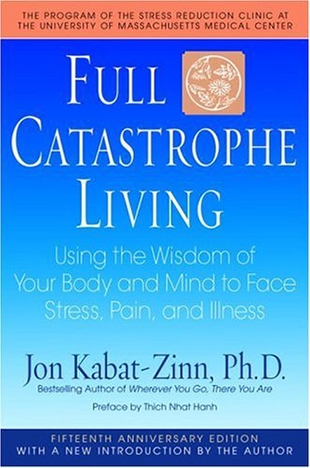This book presents the lessons of ten years of clinical experience with more than 4,000 people who took an eight-week course known as the Stress Reduction and Relaxation Program at the University of Massachusetts Medical Center. Jon Kabat-Zinn, the founder of the program, defines the healing force of mindfulness as "a systematic approach to developing new kinds of control and wisdom in our lives, based on our inner capacities for relaxation, paying attention, awareness, and insight." This form of meditation can be used to improve medical problems such as headaches, high blood pressure, back pain, and heart disease. All of these are related to stress, which has become a looming challenge when so many people's lives are frenzied and filled with constant activities.
Kabat-Zinn lays out the attitudinal foundation of mindfulness which includes non-judging, patience, beginner's mind, trust, non-striving, acceptance, and letting go. He then presents insights into the power of breathing, sitting meditation, body scans, yoga, and walking meditation. What are the lessons of such mindfulness practices? "Learning how to stop all your doing and shift over to a 'being' mode, learning how to make time for yourself, how to slow down and nurture calmness and self-acceptance in yourself, learning to observe what your own mind is up to from moment to moment, how to watch your thoughts and how to let go of them without getting so caught up and driven by them, how to make room for new ways of seeing old problems and for perceiving the interconnectednes of things, these are some of the lessons of mindfulness. This kind of learning involves settling into moments of being and cultivating awareness." All of this leads to a new way of thinking about health and illness that emphasizes wholeness and reveals the negative fallout from separation. Beliefs, attitudes, thoughts, and emotions do affect our physical well-being and healing powers.
Kabat-Zinn has many interesting things to say about stress and the dominant role we let it play in our lives. In a rousing chapter titled "Taking on the Full Catastrophe," he discusses listening to your body; working with physical and emotional pain; dealing with fear, panic, and anxiety; and coping with time stress, sleep stress, people stress, role stress, work stress, food stress, and world stress. This paperback by Jon Kabat-Zinn includes new perspectives on mind-body medicine and an expanded bibliography and resources section.
